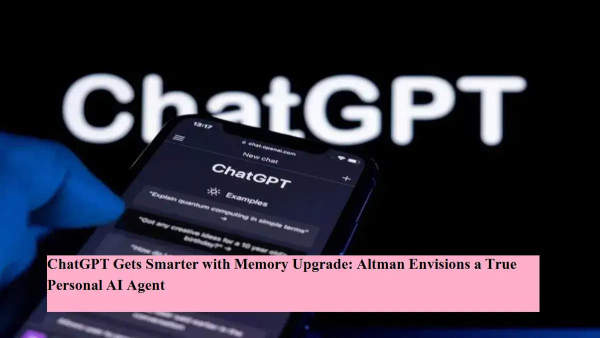
Artificial Intelligence just got a whole lot more personal. OpenAI’s widely popular chatbot, ChatGPT, is now capable of remembering past interactions with users—an update that signals a major leap forward in conversational AI. OpenAI CEO Sam Altman recently confirmed the enhanced memory feature, describing it as a transformative step toward creating a true personal AI assistant.
This evolution is set to reshape how individuals use AI—no longer just a tool for one-off queries, but a long-term digital companion that understands you over time.
Until now, most interactions with ChatGPT were isolated. You’d ask a question, get an answer, and the chat would effectively vanish the moment the window closed. That changes with OpenAI’s memory upgrade. With this feature, ChatGPT can remember previous chats, understand user preferences, and refer back to past conversations when helpful.
In Altman’s words, “This is a really exciting development. Memory makes ChatGPT more helpful, more personal, and better aligned with your goals.”
The chatbot’s memory can retain key user information such as name, favorite topics, writing style, or preferred tone. Over time, this enables a more customized experience where users don’t have to repeatedly explain themselves.
The memory function is currently being rolled out gradually. Initially, it was limited to ChatGPT Pro subscribers, but OpenAI has confirmed that it will soon be available to ChatGPT Plus users as well. The company is also preparing to roll out access for enterprise and educational users over the coming weeks.
However, users in the European Economic Area (EEA), including countries like the UK, Switzerland, Norway, Iceland, and Liechtenstein, will have to wait longer, as the memory feature hasn’t been activated in these regions due to regulatory or compliance reasons.
As for free-tier users, OpenAI has not yet provided a timeline for when the memory feature will be available.
With memory, ChatGPT can store relevant facts about your preferences, past conversations, or frequently asked questions. For example, if you’re a freelance writer who regularly asks for article drafts, ChatGPT can begin to tailor suggestions based on your writing history and tone preferences.
Importantly, OpenAI emphasizes user control. Users will be notified when memory is being used, and they can opt out at any time. A “temporary chat” mode is also available for users who prefer one-off conversations without any memory involved.
To manage memory settings, users can go to their ChatGPT settings under the “Personalization” or “Memory” tab, where they can view, edit, or delete specific memories.
Altman has called this evolution a critical move toward building personal AI agents—intelligent digital assistants that can handle tasks, understand your routines, and even make recommendations based on long-term understanding.
“This is the early foundation for something much more powerful,” Altman noted in a social media post on X. "ChatGPT will soon be able to assist in more meaningful and proactive ways—making it not just smart, but truly helpful."
While this memory enhancement may seem incremental, it’s a foundational shift in how people will interact with AI going forward. A chatbot that remembers your needs, style, and history can function more like a digital assistant, offering not just information, but context-aware support.
As ChatGPT continues to evolve, so does the vision of AI that’s less robotic and more personal, empathetic, and genuinely useful.